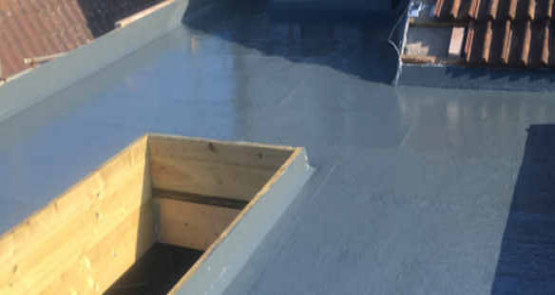There are a number of different single ply membranes on the market to choose from:


PVC Single ply membranes or vinyl chloride monomer (VCM)
Single ply membranes in PVC are vinyl chloride monomer VCM. Gas is polymerized and produces a vinyl resin, which is compounded to manufacture a durable, flexible material that is available in different colours. It can be used for all flat roof builds and are perfect for both the domestic sector and the commercial sector for flat roof coverings offering value for money spent.
TPO single ply membrane
Thermoplastic Polyolefin TPO single ply membrane is now commonly used for a covering on flat roofs. It does not contain chlorinated elements and has a track record of being extremely watertight.
EDPM single ply membrane
EPDM or Ethylene Propylene Diene Monomer is rubber technology designed especially for roofing and is commonly used by large companies for low-pitched roofs and flat roofs for over 30-years. Due to its lengthy durability and its weathering qualities being dependable it make it one of the most commonly chosen systems use for the commercial sector. As more people are realizing its qualities it is gaining ground fast in the private domestic sector. Correctly fitted an EPDM roof can resolve any flashing problem or detail.
Single ply rubber roof
This system has the unique function of being reusable as long as it has been fitted loosely and fixed mechanically. It is durable and has a proven track record to be extremely watertight and resistant to UV rays. It has proven itself for over 40 years as it was first used early 1960 and since then its presence in the low sloping, flat roof and commercial sector has increased by approximately 33%.
It offers:
Durability to withstand extreme temperatures
Even though we live in the UK you can rest assure that an EPDM membrane correctly installed will not crack, tear or split as a result from high extreme temperature weathering conditions. It has temperature movement ability from minus 59 degrees centigrade to 149 degrees centigrade.
Flexibility
This product has no pressure failure due to structural association of movement. Very much unlike Asphalt material.
Seamless with very few or no joints
Due to the material being available in a number of sizes nearly all roofs using this product in the private and commercial sector will have only one joint or no joints as they are usually fitted in one section. Any joints that are required are either taped or glued providing the same lengthy time durability.
Safe and speedy installation
EPDM rubber roofing system can be fitted almost anywhere with no bother at all. Their installation can cause no disruption whatsoever for the ongoing of other works on a project such as new build or a refurbishment. They do not require heat so an open flame is not necessary making a hot works permit not required.
Little maintenance
As the ability to add a joint or a seam using either tape or glue repairs are very simple even after many years have passed. Additional coats are not required due to the membrane having an elevated level of resistance to ultra violet rays.
Weatherproof
Due to it high durability over the years it has not suffered from the effects of rain, snow, ice or sun.
Warranties
This system is the only system that offers a manufactures 20-year and 30-year material warranty. This is when a membrane size of 1.14mm and 1.52mm is used and applied onto roofs. There also usually is a guarantee from the installer for a period of time ensuring their workmanship against any leaks.
Single plywood rubber roof
This is a layer of membrane manufactured from a number of different synthetics manmade materials. It has been over seventy years since the first single plywood membrane was made in Germany and used as a roof. Since then it has proven itself to be an effective system and has now been widely used across the world covering an abundance of flat roofs.
How do match up with other methods of flat roofing?
Because of the cheap cost and the availability of it being an easy DIY task the most common found and used material for flat roofing in the UK is asphalt or multi layered mineral felt for flat roofs coverings. Unfortunately you need to be careful when choosing the membrane you want to use and the installers or company who actually installs it. I have seen poor installations in my time due to very poorly trained fitters and staff. With all matters in day-to-day life there is always good and bad in everything and every product. The membrane industry does not escape this either. So to protect yourself it is recommended that you only go for certain membranes, which have, been tested, assessed, past and certified by the BBA to ensure a long lasting life span for the roof.
Methods of installation fixing:
Fully bonded or mechanically fastened
There is no right or wrong with either of these methods but generally speaking if your roof structure is concrete then the bonding method is best but if it is made from a timber decked then a mechanical fixing is best. However, if the fully bonded method is used the temperature must be above 5 degrees.
Glued or heat welded joints
There is no doubt whatsoever that a heat-welded joint is far stronger than a taped, glued method as we never know what the temperature and moisture content levels in the air are on a day to day basis as this will effect the glue and tape adhesive being used as a heat gun does not suffer from this so it has proven itself to be a lot more reliable to use in certain weather conditions.
The guarantee
The guarantee normally issued with these systems, ranges from 15 to 20 years depending on the installer and their guarantee promise to include in some cases insurance backed policy.
They should be:
Picking the correct contractor
Procuring the right membrane is just half the battle. You also need to ensure you choose the appropriate installation team with adequate knowledge and experience to get the job done speedily, correctly and with minimum disruption to you and your day-to-day life. Check they are approved installers of the product you have chosen, ask to see their public liability to ensure it covers you and your property whilst they are there working and ask for references on other projects they have carried out. All this together will mean you will have a smooth trouble free installation, which will last for many years.
Also remember that there are a great number of new build projects happening at present and these tasks usually are a lot simpler to perform than renovating an older property or stripping an existing roof and applying new coverings so ensure your chosen contractor has the correct knowledge and experience to get the job done right.


Please feel free to contact us for further advice
If you are interested in booking a survey for any of our services or just a roof safety check, please contact Plymouth Roofing Solutions on 01752 201077 and a member of our team will be happy to help or advise you.
We will make an appointment and one of our surveyors will come to see you, survey the project, have a chat, and give you some free advice. Our team is dedicated in listening to what you have to say and accommodating your every need. We will advise you on what we think would be best and never recommend doing any more than is required or necessary. We also we attempt a solution that stays within a budget that you may have.
Our professional team of qualified tradesmen carries out their work to the highest standard causing you as minimal disruption as possible to your day-to-day life and always leaves the job clean and tidy on a daily basis. We have public liability insurance of £10 million pounds that can be viewed on request. We have skilled tradesmen in all forms of carpentry, roofing, lead work, and lead welding.